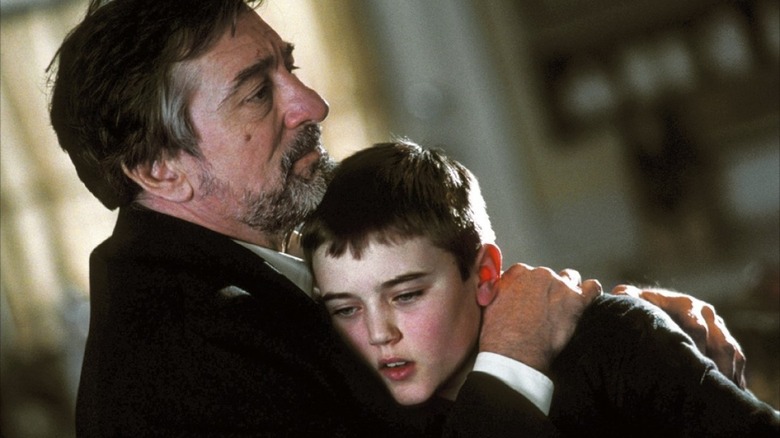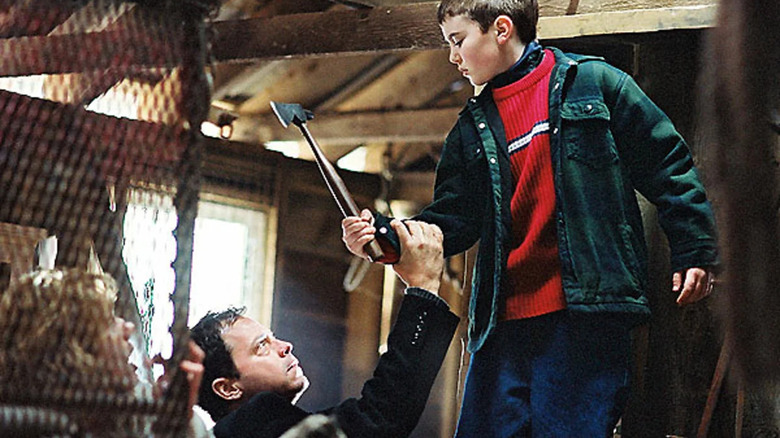Robert De Niro's Godsend Was Anything But That When It Flopped In The 2004 Box Office
While Robert De Niro is unquestionably one of the greatest actors of all time, he has a slew of terrible projects in his filmography where he delivers dreadful performances. For every "Raging Bull," there's "Rocky and Bullwinkle"; for every "Deer Hunter," there's "Dirty Grandpa." I've seen a lot of Robert De Niro films, but "Godsend" fell under my radar. Probably because it isn't even so-bad-it's-good. It's just ... bland.
According to Bomb Report, this was executive producers Todd Wagner and Mark Cuban's first title for their new company 2929. Working with two directors, Frank M. Calo and Nick Hamm, from Mark Bomback's tepid script, "Godsend" was slated to release in 2003 but delayed to 2004 for reshoots. There were four alternate endings included on the DVD special features, indicating that the filmmakers didn't really know what kind of story they were trying to tell.
Released on April 30, 2004, "Godsend" was met with awful reviews. Box Office Mojo reports that "Godsend" had a $25 million budget and went on to earn $14,379,751 domestically and $30,114,487 worldwide. It debuted at #4, far behind the hit "Mean Girls," and continued to descend as it failed to convert audiences. While "Godsend" has a fascinating premise about a couple who agrees to have their deceased son cloned and reborn, the film does not have the riveting tension of other early 2000s horror like "The Others" or deeply explore existential questions about the quest for immortality, ethics of human creation, or whether nature or nurture impacts identity, as in Steven Spielberg's "AI: Artificial Intelligence."
An experiment gone wrong
The story of "Godsend" is "Frankenstein" meets "The Omen," about a Manhattan couple Paul and Jessie Duncan (Greg Kinnear and Rebecca Romijn) who lose their child Adam (an obvious reference to the first man in the book of Genesis) after he is hit by a car. A mysterious doctor played by Robert De Niro randomly approaches the grieving couple and offers them a chance to participate in a risky experiment to resurrect their son (Cameron Bright, who also played a creepy kid in "Birth," from the same year).
With their new version of Adam, they move from the big bad city to the quiet comfort of the Vermont suburbs. The film makes uncomfortably racist comparisons between these two environments, suggesting that Greg is better off teaching intelligent white kids than the inner-city children of color who just end up as criminals when they graduate. When Adam turns eight years old, the same age that the original Adam tragically died, he starts to have strange visions and develop a menacing personality.
The only interesting thing about "Godsend" is the promotional campaign behind it. Lionsgate set up a website for the fictional Godsend Institute that stated they could bring back the dead. Sadly, they received countless inquiries and had to add a disclaimer on the site informing visitors that it was an advertisement (via Bomb Report). This indicates how the story of "Godsend" could have resonated with many people. I think everyone would take the same chance as the Duncans to see their loved ones again. However, the film completely fails to explore this idea in any meaningful way.
Lifeless characters and visuals
"Godsend" takes a great idea and executes it poorly. Instead of exploring the moral complexity of Adam's second life, the filmmakers settle for horror genre tropes like cryptic dreams with canted angles, jump scares in the bathtub, and ominous close-ups of the bad seed's face. There is no visual elegance to any of the shots which are bathed in murky blues, greens, and yellows. The sterile Godsend Institute is a bright white that does not even feel foreboding, just plain.
The talented cast can't rise above their poorly-written roles. Even Greg Kinnear's approachable everyman quality can't make his character very sympathetic. He and Romijn give it their all as grieving parents, but they struggle against the weight of the story's absurdity. They are given zero personality traits outside of their predicament or professions, so it is difficult to feel much of a connection to them. De Niro barrels through his florid dialogue as if he is bored, barely bothering to give the dubious science behind his cloning experiment any emotional resonance.
The main issue with "Godsend" is its pacing. There is no sense of excitement or suspense because the twist unfolds in such a drawn-out and confusing way that the film feels longer than its actual runtime. With the sluggish movement, evil child cliches, and flat protagonists, we have little reason to care about what happens. Everything finally builds to a lackluster finale that feels hastily tacked on. "Godsend" is not the answer to our moviegoing prayers for a good horror film.


